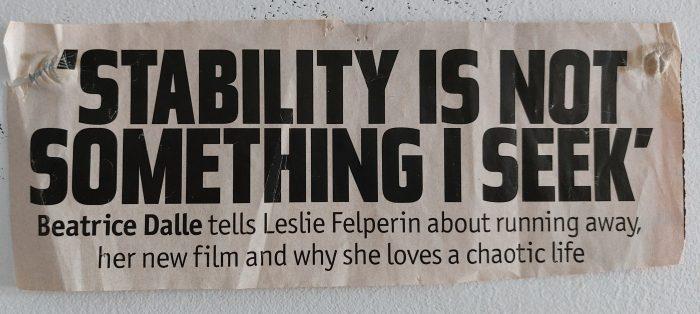The three stages of live-in care work.
Before, during and after.
Great expectations. Asking the right questions.
That’s where Care &Choice come into their own.
They ask all the questions before you speak to the client and/or representative.
Recently I have noticed this is a crucial client question on their application form.
I would particularly like a Caregiver who….
Recognises when she needs to have time on her own.
Sometimes the carer can be overbearing, well meaning, of course, or even needy.
More so than the client!
Some carers worry that they are not giving their all or the client is not getting their money’s worth?
But what is important to one person means diddly squat to another.
And that’s where, lost in translation comes in.
Colloquialisms are aplenty in this country.
What is deemed inappropriate in Surrey maybe ‘owt wrong with that’ or par for the course in Yorkshire.
So maybe you will have to put your ‘only kidding’ jolly japes on hold for a while.
Of course, you are who you are but I think it is up to us carers to take our cue from our clients who, after all, are welcoming us into their homes and lives.
Even after twenty nine years I am still surprised at the diversity of the human race on one small island. Backgrounds, personalities. It’s never boring.
So, can you ask all the right questions before you accept a position?
Care and Choice are the #1 ‘matchmakers’ and they certainly do their best so that clients and carers feel at home with each other.
However, I always bear in mind the one lady I went to in Yorkshire for the first time.
The departing carer literally sped past me and out through the front door saying, Good luck! She’s the most difficult client I have ever had! Phone me if you need anything, I’ve left plenty of notes. Whoosh…
The client, sitting snugly in her armchair, had clearly heard this outburst and roared with laughter.
Gauging her sense of humour I said. So, that went well then?!
I returned to this client regularly and became almost part of the family.
The next few days I managed to discover that the client’s short term memory loss was something the outgoing carer had found particularly difficult to cope with.
Yes, the repetition is something of a challenge and how you deal with it depends very much upon the client.
This particular lady still had a tenuous grasp of the fact that she was repeatedly asking the same question and often apologised.
We managed it and I do mean we, by using strategic post notes.
Calendars, day, time all needed to be written large and easily accessible. Fortunately her eyesight was fine.
I discussed with her in her good moments how we would tackle her feeling of losing her grasp. Somehow it reassured her enough to feel the trust that is needed for this to work.
With some clients this is impossible and you just have to go with the flow.
Nothing negative, move on and change the subject…gently, is the rule of thumb.
So, let Care & Choice ask the questions but be open to…Surprises, accommodation wise as Downton Abbey turns into the only house on the street that looks ready for demolition.
Highclere Castle from Wikipedia
Delapidated house from Pinterest.
During your stay adaptability is the key with boundaries set at the outset with representatives if dementia is involved.
I truly learn something about myself with every client.
Looking back over such a long period I realise where I could have done things differently with some clients.
But very rarely it is just you and them and that input from family, friends and neighbours can mean a lot of juggling.
You will never please everyone all the time.
Your duty of care has to be with your client, first and foremost.
Unfortunately, some family members may have hidden agendas but we cannot get involved, unless the client is clearly in some kind of danger.
Then you should always make your agency aware of any issues.
I have done the occasional private live-in care job but for me there are two important reasons for working through an agency.
- If you are unwell and can’t go to or continue with a client your agency will find other help.
- They have a wealth of experience in the care industry (not sure I like that word) and will always be supportive if problems arise and do their best to resolve them.
And what is still the most important thing in my suitcase, you ask?
Lopsided earphones with a long lead.
 Okay, not the earphones I wear indoors. Photo taken during a flying lesson but still lopsided 😉
Okay, not the earphones I wear indoors. Photo taken during a flying lesson but still lopsided 😉
I say lopsided because that’s how I wear them at night. One ear tuned into the tv, a reasonable distance away and the other ear uncovered in case the client calls out.
And here’s a useful tip from my visit this week to Specsavers.
Me: I get really dry eyes, especially during the night. Is it due to too much screen time?
Optometrist: A recent study has shown the problem is to do with staring and not blinking rather than the screen itself. Watching a screen for any length of time we tend to either not blink or only half blink. Blinking keeps the eyes moist. So now I tell clients, when you hit send, blink fully. It helps.
I just blinked, twice 😉
From the goody bag.
Stability is not something I seek. *
I first put this up in my house (not sure where) near the phone about twenty years ago.
So each time my mother phoned I looked at it and thought…Let’s try another response to the inevitable…When are you going to settle down again? …question.
That simple statement* was not cutting it.
The generation that became mothers in the 1950s by and large fulfilled an agenda carved out for them.
Not being married, having kids, duties in all directions was generally seen as a failure rather than freedom.
And so the 1950s wives and mothers worried about their baby boomers who often took a different approach.
Many authors fall into this category and if you haven’t read any of Deborah Levy’s books you are in for a treat.
I recommend: Hot Milk.
But get yourself a good headrest as you may find yourself nodding…a lot.
And don’t forget to blink.




